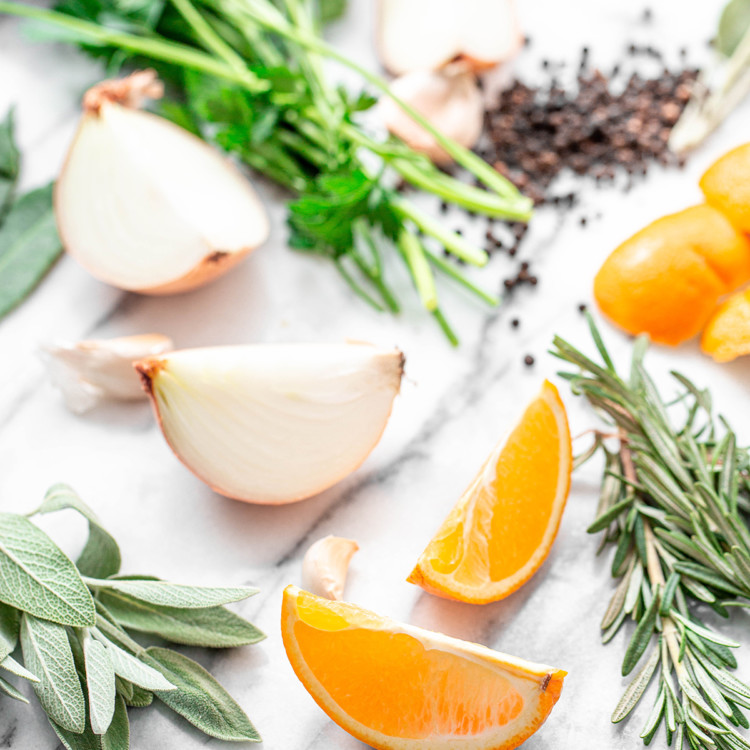
Fresh Herb and Citrus Turkey Brine
This Fresh Herb and Citrus Turkey Brine combines lots of fresh herbs with a subtle hint of citrus. Brining your Thanksgiving turkey in this citrus brine will tenderize the meat and infuse it with a TON of flavor for Turkey Day!
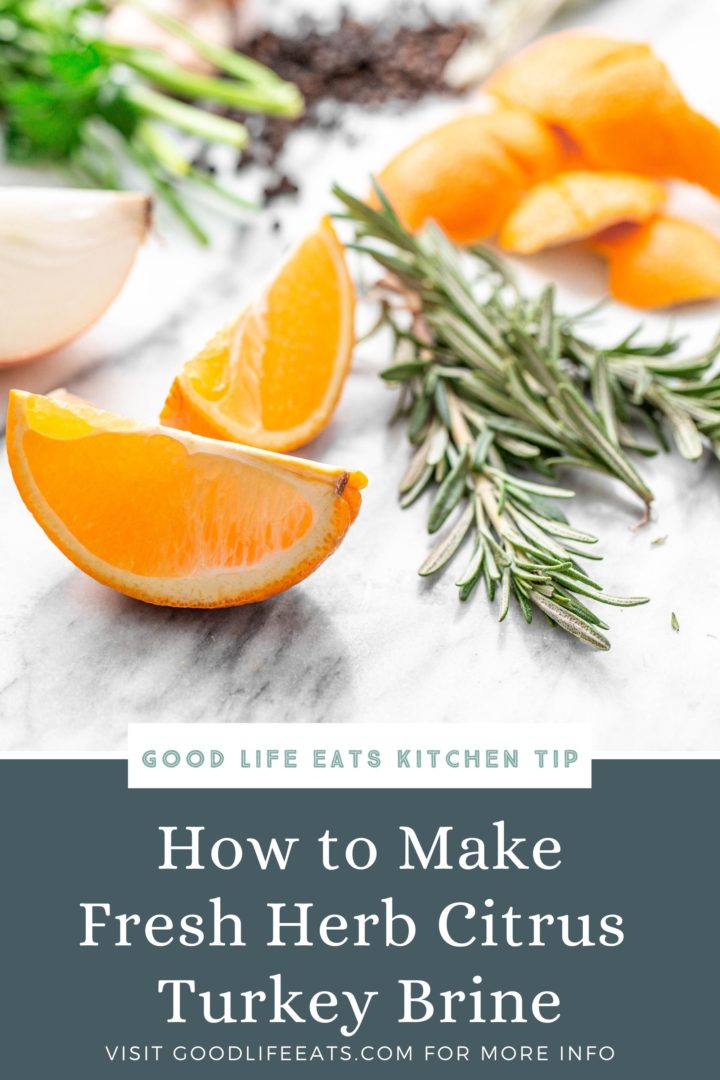
This post may include affiliate links. As an Amazon Associate and member of other affiliate programs, I earn a small commission from qualifying purchases.
The Best Citrus Turkey Brine
Picture this: 17 years ago, I am a young bride to be and I’m meeting my (now former) in-laws for the first time. It’s a rainy Thanksgiving evening in Washington and my soon-to-be Mother-in-Law (now former mother-in-law) has just prepared the BEST.TURKEY.EVER.
The turkey has amazing, juicy flavor and the breast meat isn’t dry at all. I think to myself, “where has this turkey been all my life?” It was definitely not the kind of turkey I ate growing up!
The answer: Brining. I had no idea what turkey brining was, but I was eager to learn.
I knew that I’d soon have the experience of being in charge of roasting my own turkey and I wanted it to taste just like my Mother-in-Law’s did.
Nearly 2 decades later, I can tell you that for as long as I’ve been making my own turkey, I’ve been using a turkey brine, like this Citrus Brine, before roasting my turkey.
Why I Love this Citrus Brine for Turkey
This fresh herb and citrus turkey brine infuses roasted turkey with so much flavor and helps keep the meat moist. It’s a must have for me when I’m hosting Thanksgiving.
A flavorful brine is the best way to ensure a delicious, juicy turkey.
I happen to really enjoy the combination of sage, rosemary, thyme, and parsley in my turkey brine. Pair it with tangerine or orange peels and you have a delicious citrus brined turkey.
You can play around with the herbs for your brine, if you like, for different flavors. Just be sure to use fresh herbs. I think that makes all the difference.
Helpful Tools When Making a Citrus Turkey Brine
You’ll need a few different tools to prepare this easy turkey brine recipe. Here’s what I recommend having on hand before getting started:
- Large Stock Pot – to prepare the citrus turkey brine recipe in.
- Measuring Cups and Spoons – to measure the ingredients for this citrus brine.
- Brining Bag or Large Container – to place turkey in during the bringing process. Make sure it is large enough to fit the entire turkey plus the cooled brine.
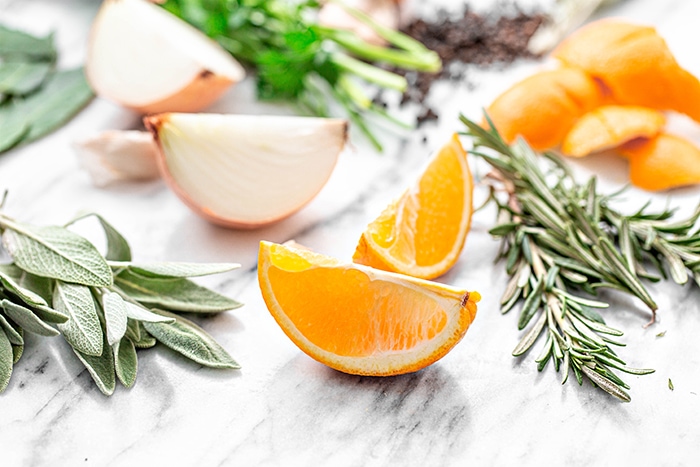
Ingredients for Citrus Turkey Brine
This is one of my favorite turkey brine recipes for roasted turkey. You’ll need the following (be sure to scroll to the bottom of this post for a free printable copy of this Citrus Brine Recipe!):
- Kosher Salt
- Brown Sugar
- Peppercorns
- Allspice Berries
- Bay Leaves
- Fresh Thyme
- Fresh Sage
- Fresh Rosemary
- Fresh Parsley
- Garlic Cloves
- Tangerine or Orange Peels (or both!)
- Boiling Water
- Cold Water
For the complete citrus brine ingredients list and detailed instructions, scroll to the bottom of this post for the FREE printable recipe card.
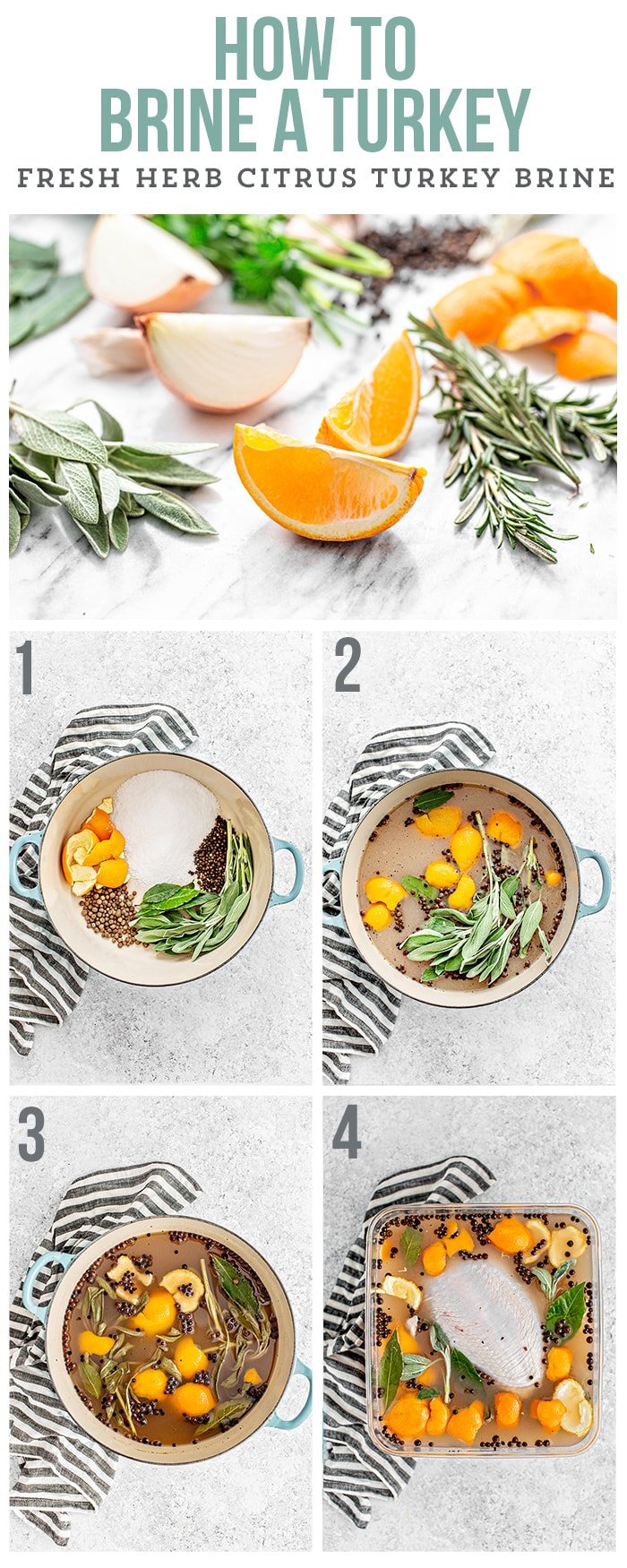
How to Citrus Brine a Turkey
This citrus brine turkey recipe has a few different sections to it: preparing the brine, brining the turkey, and roasting the turkey. I’ll break the process down below:
Make the Citrus Turkey Brine:
- Combine salt, sugar, spices, herbs, garlic, and citrus fruit in a large pot with 1 gallon of water. Bring the salt mixture to a boil.
- Add 1 gallon of water and bring to a boil.
- Then, turn the heat off and cool to room temperature before stirring in the cold water to bring the total liquid volume to 2 gallons.
- Once you’ve prepared the citrus brine, you can begin the brining process. Keep reading for an overview of the steps essential to the brining and cooking process.
The above is simply a quick summary of this recipe. Check out the full recipe in the free printable recipe card at the bottom of this post for all the detailed instructions.
Citrus Turkey Brine FAQs
Got questions about preparing and using this citrus brine for turkeys? Here are a few commonly asked questions. Feel free to leave any other questions in the comments on this post and I’ll respond with answers.
What Size Turkey Should I Use for this Citrus Brine Recipe?
I typically choose a turkey around 16-18 lbs. It allows for some leftovers but not so much that we all get tired of it.
If using a larger turkey, simply extend the roasting time and tent the breast with foil to avoid over browning.
Alternatively, you can prepare 2 smaller citrus brined turkeys if you need more meat but you want shorter cook times. Personally, I prefer this method because the exterior meat has less opportunity to dry out while waiting for the interior of the bird to finish roasting.
How Long to Citrus Brine a Turkey?
How long you will brine your turkey in this Fresh Herb and Citrus Turkey Brine largely depends on how big the piece of meat is.
A simple boneless, skinless chicken breast or a couple of pork chops don’t need more than an hour. In contrast, a large 18+ pound turkey will need several hours or up to a full day to soak in this citrus brine to fully benefit from the process.
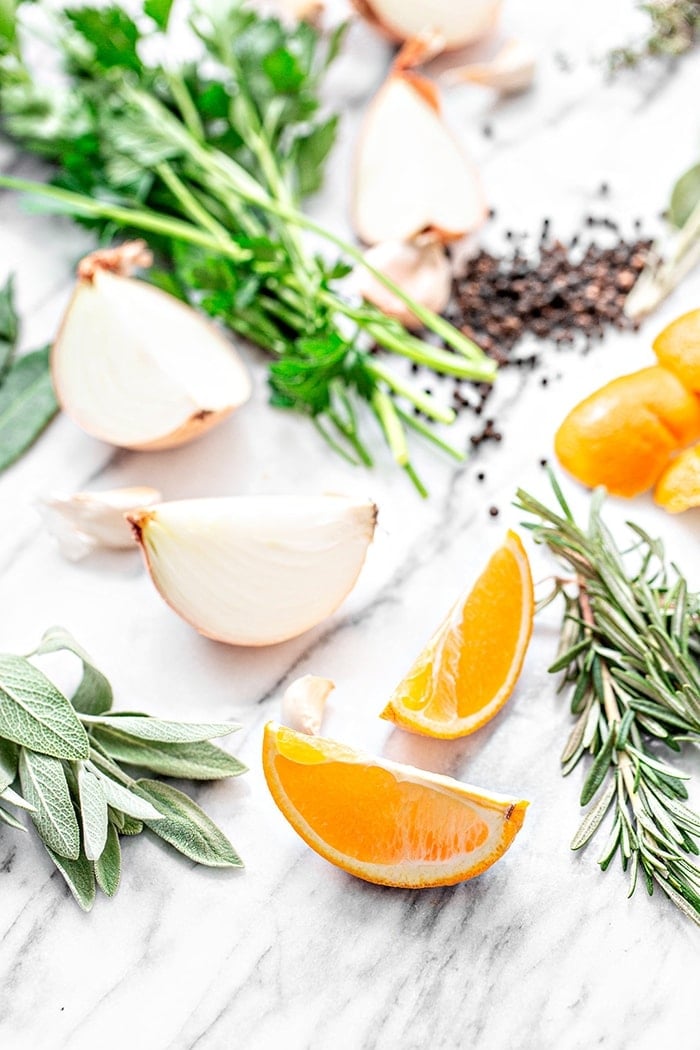
Citrus Brining Time Guide
Here’s an overview of how long you’ll need to brine various sizes of meat using this recipe:
- 12 – 16 lb. Whole Turkey: 12 – 36 hours, depending on size (or longer if it is a larger bird)
- Turkey Breast: 4 – 8 hours
- Large Whole Chicken: 2 – 6 hours
- Individual Chicken Breasts: 1 hour
How to Store a Brining Turkey in a Cooler instead of Refrigerator
If your turkey is too large to fit in your refrigerator after you have placed it in the container with the brine, your can store it in a cooler as long as you are able to maintain the temperature below 40 degrees while the turkey brines.
- First, you’ll need to put the turkey and the citrus brine in some king of sealed bag.
- Extra large ziplock bags work well because they are sturdy.
- Once the bag is sealed with the turkey and the brine, place it in a well insulated cooler. It is best if you have a high quality insulated cooler, the type that is meant to keep cold for several days.
- Pack ice all around the turkey.
You would not want to add the ice to the brine itself because it would dilute this citrus brine, so that’s why it is important to seal the turkey separately with the citrus brine.
If you live somewhere with cold weather and know that the forecast will stay under 40 degrees for the high (but not so cold that your turkey freezes by being stored outside), then you can place the cooler outside or in a garage where it is colder than your house.
Make sure to keep it out of the sun and away from animals.
Can I Citrus Brine My Turkey Ahead of Time?
Have you ever wondered: What do you do if due to your schedule you need to brine the turkey earlier than 24 hours before roasting?
If you brine your turkey too early and for too long, it will be incredibly salty.
But if, due to time constraints or fridge space you need to plan ahead, here’s what I recommend:
- I suggest brining it for the 12-24 hours you need.
- Then, remove the turkey from the Fresh Herb and Citrus Turkey Brine and rinse it inside and out. Pat it dry with a paper towel.
- Then store the citrus brined turkey in the fridge for up to an additional 24 hours until you are ready to roast.
- After that, you can proceed to roast as you normally would.
Do You Rinse a Turkey After Brining?
It isn’t required, but this is also a good troubleshooting method if you are concerned about the turkey being too salty.
Rinse inside the turkey cavity and the exterior to remove any excess Citrus Brine residue will decrease the saltiness.
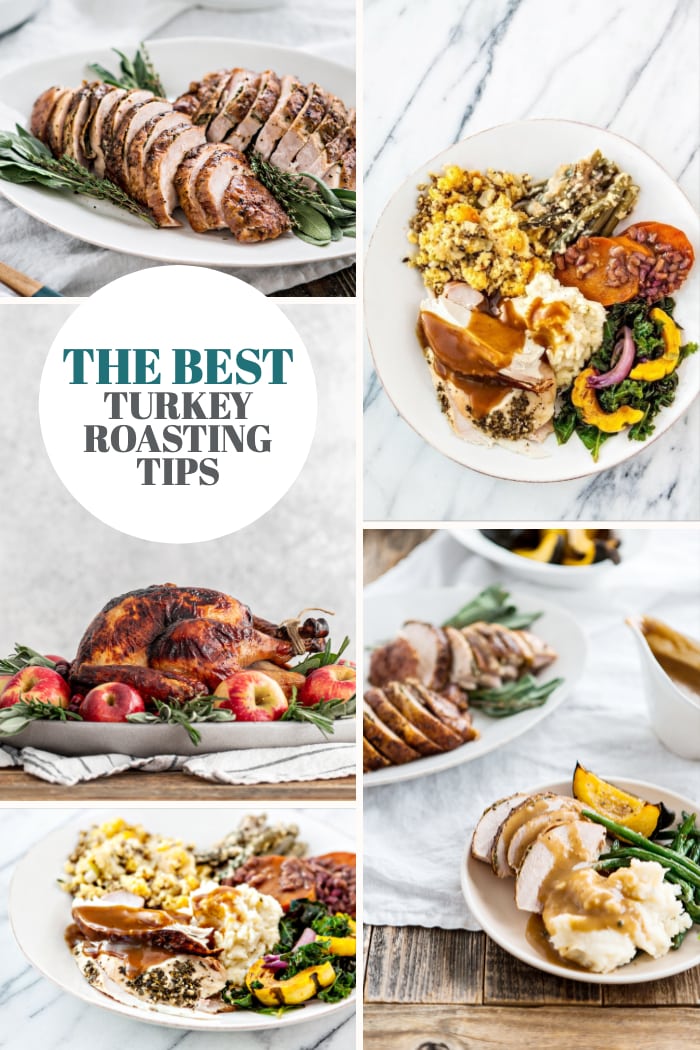
Tools Needed to Roast a Citrus Brined Turkey
Before you begin preparing your Fresh Herb and Citrus Turkey on Thanksgiving, you’ll need to make sure you have some of the required equipment. In order to roast your citrus turkey, you need a few things:
- Citrus Brined Turkey
- Probe Thermometer
- Roasting Pan with Rack
- Oven
- Big cutting board
- Carving Knife
How to Roast a Citrus Brined Turkey
Before you get started, head over to my How to Thaw a Turkey tutorial where I share the safest (and easiest!) ways to thaw a whole turkey, turkey breast, turkey wings, or turkey legs as well as one way you should NEVER thaw a turkey.
1. Preheat the oven to 375 degrees F.
Pat the citrus brined turkey dry, then let it sit at room temperature for 30 minutes.
2. Slather the outside of the fresh herb and citrus brined turkey in butter (such as this garlic herb butter)
I love a mixture of finely chopped rosemary, sage, and thyme added to the softened butter. Make sure to get the butter inside the cavity of the turkey, on top of the breast meat underneath the skin, and all over the outside.
3. Place herbs under the skin covering the breast, if desired.
Stuff the cavity with additional herbs, if desired, and an onion cut into sixths. Cover the wing tips with foil.
4. Use a V-Rack roaster to roast your citrus brined turkey.
Place 3 cups of water in the bottom of the pan. Add chopped onion and carrots at the bottom of the roasting pan. Place the turkey on the rack, starting with it facing breast side down. Roast for 45 minutes.
5. Remove the turkey from the oven, flip it breast side up, and baste the turkey with pan drippings. Cover the breast with foil.
6. Add an 2 more cups of water to the pan.
Roast the turkey for an additional 1 1/2 hours to 2 1/2 hours, until the meat thermometer inserted in the breast registers 160 degrees F and the leg/thigh registers at about 170 degrees F.
7. When the turkey has reached the correct temperature, remove it from the oven.
Tent the turkey with foil and let it rest for 30-45 minutes on a large cutting board before carving.
Planning to make an old-fashioned stuffed turkey for Thanksgiving? The end results will be delicious so long as you take the proper precautions to cook the stuffing properly! Check out my How to Roast a Stuffed Turkey tutorial so your bird turns out moist and juicy and the stuffing gets fully cooked through.
FAQs: Citrus Brined Turkey Roasting
Got questions about roasting a citrus brined turkey? Here are the answers to a few commonly asked questions. Feel free to leave any other questions in the comments on this post and I’ll respond with answers.
Is it Safe to Stuff My Citrus Brined Turkey?
I don’t recommend stuffing an uncooked turkey. Here’s why:
- The stuffing may not reach a high enough temperature to kill bacteria.
- Your turkey will cook faster without a stuffed cavity.
How to Safely Stuff a Turkey
If you really love stuffing inside your turkey, there are two ways to safely stuff a turkey:
- My recommended turkey stuffing method is to prepare and cook the stuffing separately while the turkey roasts. Then, place the stuffing into the turkey once it is done roasting.
- An alternative is to stuff the turkey as is traditionally done by placing the stuffing in the cavity of the raw turkey. DO NOT pack it tightly so the air can circulate. You will need to take the temperature of the stuffing as well as the turkey meat. The stuffing also needs to reach 165 degrees F to be safe to eat. The problem with this method is that the meat can often reach higher temperatures and then turn out dry.
How Long Does it Take to Cook a Citrus Brined Turkey?
There are a few things to know about roasting your turkey, and an important keys to success is cooking by temperature.
I prefer to cook by temperature, not time. You avoid overcooked dry meat and undercooked unsafe meat when you use a digital probe meat thermometer.
Place the probe in the thickest part of the breast before you begin cooking this Fresh Herb and Citrus Turkey.
Turkey roasting times vary depending on a variety of things, such as:
- the size of the bird
- internal temperature of the bird when you begin
- what temperature you choose to roast the turkey at
- your oven – ever oven runs slightly different (some hot, some cold, some exactly right)
So, it is better to have general time guidelines and specific temperature milestones to meet rather than cooking for x number of hours.
Turkey Cook Time Guidelines
It is totally helpful to be able to estimate about when your turkey will be done so you can plan the rest of your meal.
So, an unstuffed turkey roasted at 375 degrees F will take approximately 15-20 minutes per pound to cook to the proper internal temperature.
What Temperature is a Citrus Turkey Done
According to the USDA, a turkey is done with the internal temperature reaches 165 degrees F. This is why I love to use a digital probe meat thermometer. It eliminates all guess work!
Reader Reviews for this Citrus Turkey Brine
★★★★★
Sarah says –
“I made a turkey for the first time ever this year – and shared it with our family of 10 adults. I used this brine recipe then stuffed the turkey with onions, carrots, sage and thyme.
This was the best we have ever had, no kidding. This brine made the turkey so moist and delicious. My father, who is a dark meet eater because white meat is too dry, made the comment that the white meat of this turkey was better than the dark.
Thanks for sharing and helping me make my first turkey experience wonderful.”
★★★★★
Scott says –
“I followed all your recommendations including multiple pats of unsalted butter under the skin. Everyone (10) at the table agreed: Best Turkey EVER!! Totally the hit of the day.
Thanks so much for the hints when cooking a liquid-added turkey. I added a couple cut up apples and onions to the cavity. Everyone loved the citrus overtones of the meat, and it was so moist! 5 stars.”
More Turkey Brine Recipes
Brining your turkey with this Apple Cider Sage Brined Turkey before roasting will not only infuses the meat with the delicious flavors of fresh apple cider and sage, but it will help keep the meat moist and tender.
Brining a turkey in this Rosemary Beer Smoked Turkey Brine will tenderize the meat and infuse it with a TON of flavor thanks to the beer and fresh rosemary for Thanksgiving! This brine is great on a Smoked Turkey!
Want to try something different than a wet brine? Dry brining a turkey with this Garlic Herb Peppercorn Dry Brine is really simple and produces juicy, seasoned turkey meat.
Not feeling a turkey this year? Or maybe you want ham to go along with your roasted turkey? Make this Slow Cooker Spiral Ham with Honey Mustard Glaze instead.
If you’re looking for additional turkey brining inspiration for your Thanksgiving Menu this year, here are a few other favorite recipes to go along with this Fresh Herb and Citrus brine. Be sure to check out the whole Thanksgiving Recipes Archive right here if you need help building the rest of your menu.
Get More Thanksgiving Recipes via Email
Love this recipe for Fresh Herb and Citrus Turkey Brine? Sign up for Good Life Eats Email Updates and never miss another recipe!
Have you ever tried a Citrus Brine for turkey before?
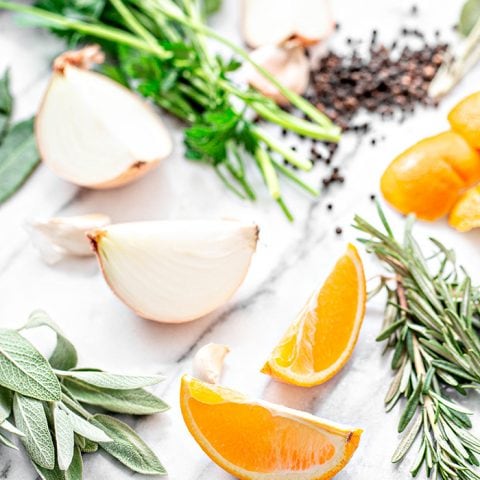
Fresh Herb and Citrus Turkey Brine
This Fresh Herb and Citrus Turkey Brine combines lots of fresh herbs with a subtle hint of citrus. Brining your turkey will tenderize the meat and infuse it with a TON of flavor for Turkey Day! This brine amount works for one 16 - 20 lb turkey.
Ingredients
- 1 cup Morton's kosher salt* (see notes)
- 1 cups brown sugar
- 1 tablespoon whole peppercorns
- 1 teaspoon whole allspice berries
- 4 bay leaves
- 5 stems fresh thyme
- 3 stems fresh sage
- 2 tablespoons fresh rosemary leaves
- 1/4 cup loosely packed parsley (stems ok)
- 4 cloves garlic garlic, smashed
- peel of 3 tangerines or oranges
- 1 gallon boiling water
- 1 gallon cold water
Instructions
- Combine the salt, brown sugar, peppercorns, allspice berries, bay leaves, thyme, sage, rosemary, parsley, garlic, and tangerine peel together in a large stock pot.
- Add 1 gallon of water.
- Bring the mixture to a rolling boil, remove from heat.
- After removing from heat, steep the mixture for 45 minutes.
- Then, add 1 gallon of cold water to bring the brine amount up to 2 gallons (2 gallons = 32 cups). This is very important otherwise you will have an incredibly salty turkey.
- For smaller stock pots, you may have to allow the brine to cool and add the additional amount when pouring the brine into the bag in the following step.
- Rinse your turkey inside and out and remove the giblets.
- Place the turkey in a large zip-top bag. I recommend the Ziploc Big Bags (size large). Put the bagged turkey in a clean cooler.
- Pour the brine over the turkey, in the bag, making sure the breasts are fully submerged. Zip the bag closed.
- Place the cooler in a cool place, such as your garage or, and allow the turkey to soak in the cold brine for 12 - 24 hours.
- Use gel ice packs or bagged ice around the zipped bag inside the cooler, if necessary, to keep the brine below 40°F. (Adding more ice directly to the brine would only dilute it.)
- Alternatively, if you have room in your refrigerator, you may place the bagged turkey in a large foil tray rather than a cooler and store it on the fridge shelf.
- After the brining process, transfer the turkey to a roasting pan and discard the brine. Roast according to your preferred method.
Notes
Kosher Salt
Do not use table salt or fine sea salt as it will be much too salty. This recipe calls for coarse Kosher salt, preferably Morton brand.
Depending on the brand of kosher salt you use, you'll need different amounts of salt because the different brands available on the market have different densities.
I use Morton's kosher salt in this recipe, however here are the conversions:
- Diamond Crystal 2 cups salt per gallon of liquid.
- Morton's kosher 1 cups salt per gallon of liquid.
Brining Time Guide
For a smaller turkey you may make less brine; however, be careful to do so with the original proportions of ingredient still intact.
Too much salt will leave you with an incredibly salty turkey.
Also, birds less than 10 pounds will likely not need to soak for the full 24 hours to achieve the desired results.
- Whole Turkey: 12 - 36 hours
- Turkey Breast: 4 - 8 hours
- Large Whole Chicken: 2 - 4 hours
Turkey Cooking Time Guidelines
It is totally helpful to be able to estimate about when your turkey will be done so you can plan the rest of your meal. I recommend letting your turkey sit at room temperature for 1 hour before you start roasting it.
So, an unstuffed turkey roasted at 375 degrees F will take approximately 15 - 25 minutes per pound to cook to the proper internal temperature.
Recommended Products
As an Amazon Associate and member of other affiliate programs, I earn from qualifying purchases.
Nutrition Information:
Yield: 12 Serving Size: 1Amount Per Serving: Calories: 86Total Fat: 0gSaturated Fat: 0gTrans Fat: 0gUnsaturated Fat: 0gCholesterol: 0mgCarbohydrates: 22gFiber: 1gSugar: 19gProtein: 1g
GoodLifeEats.com offers recipe nutritional information as a courtesy and is an estimate only. This information comes from online calculators. Although GoodLifeEats.com makes every effort to provide accurate information, these figures are only estimates.
This post for Fresh Herb and Citrus Turkey Brine was originally part of a holiday recipe theme week with giveaways. The giveaway has been removed as it is now expired, however the original comments remain.
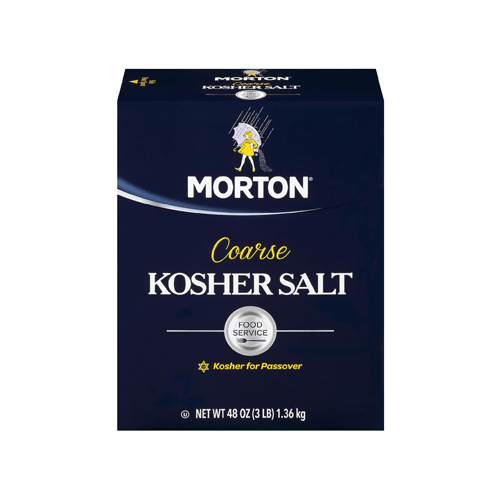


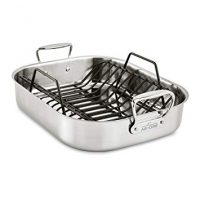
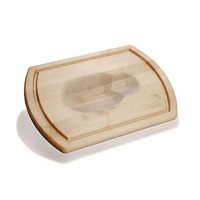
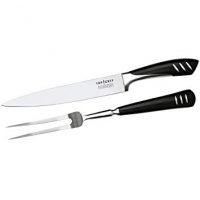
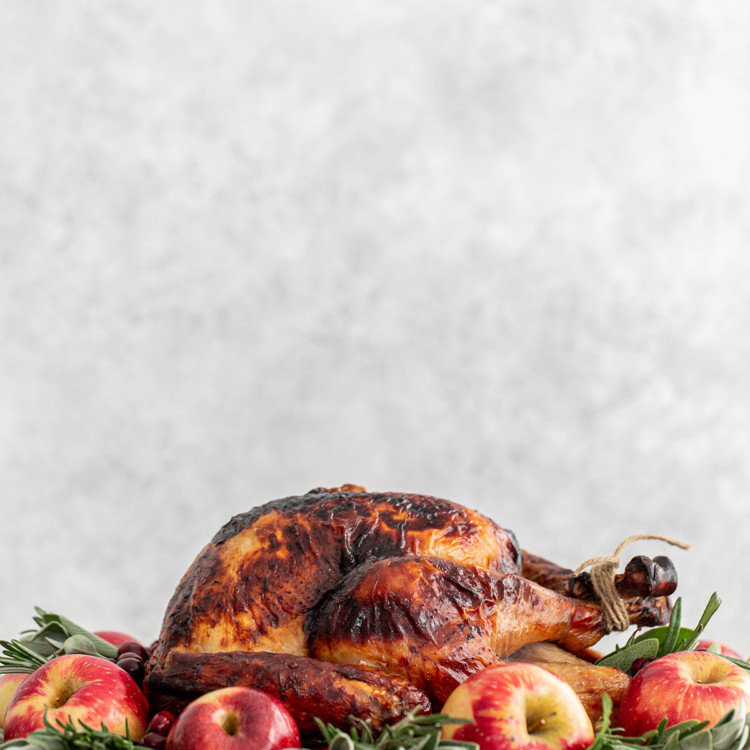
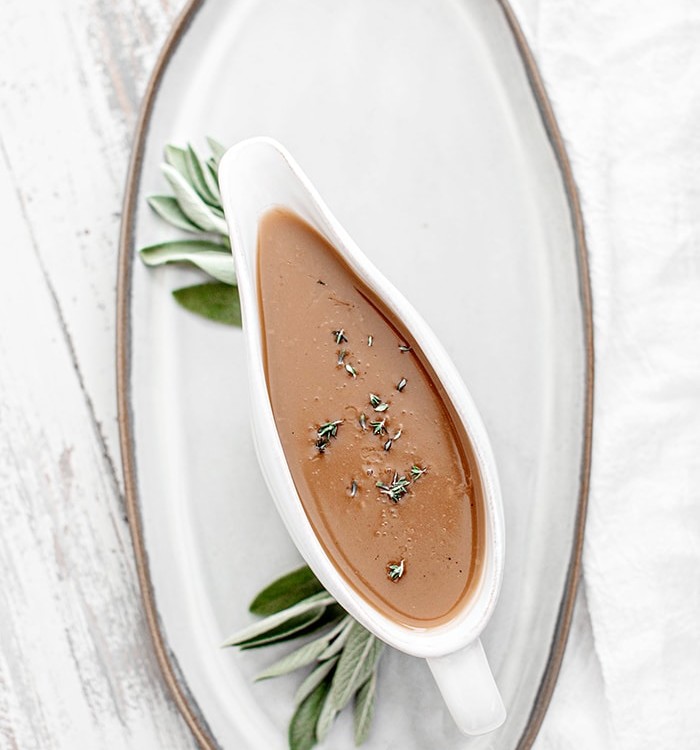
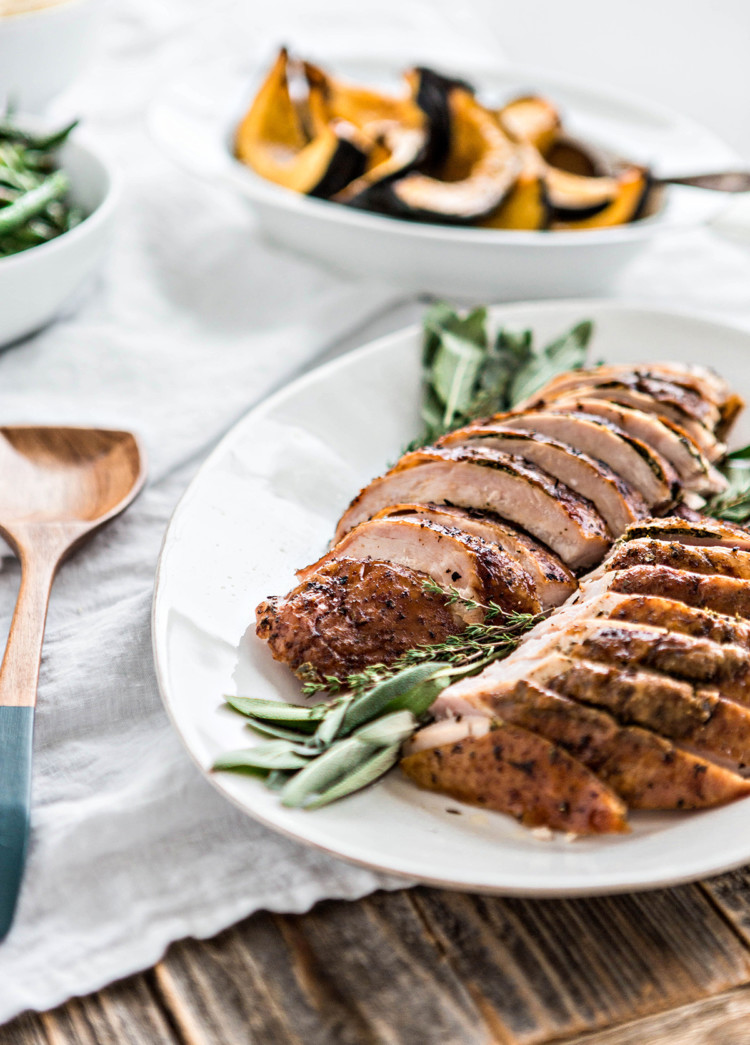
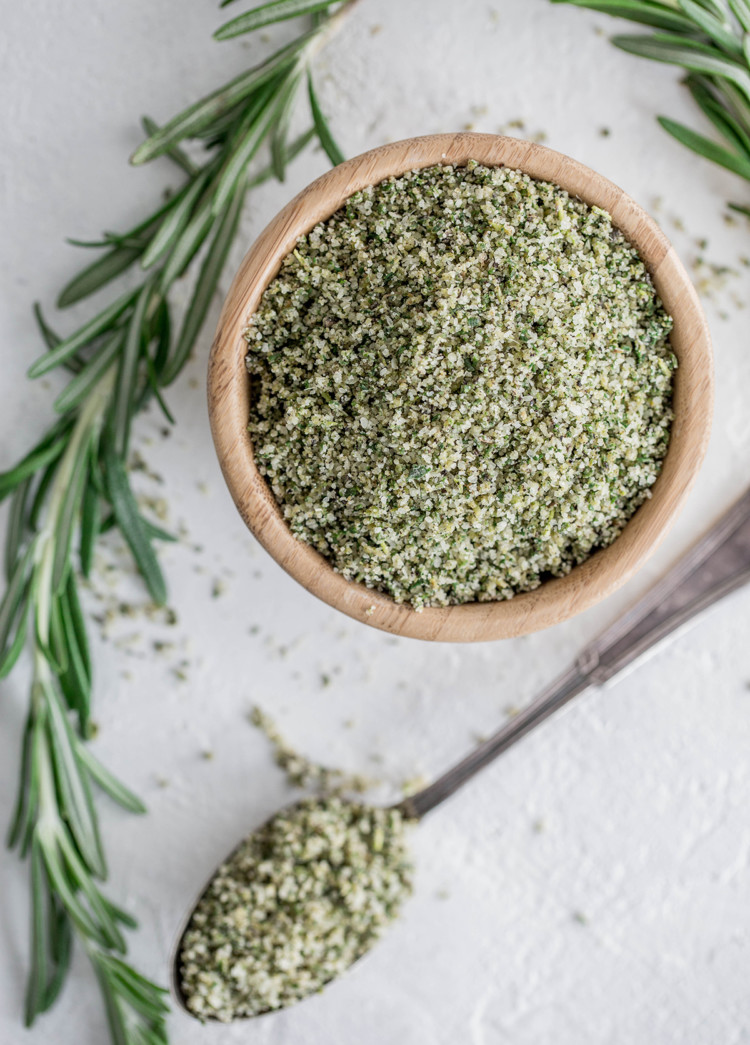
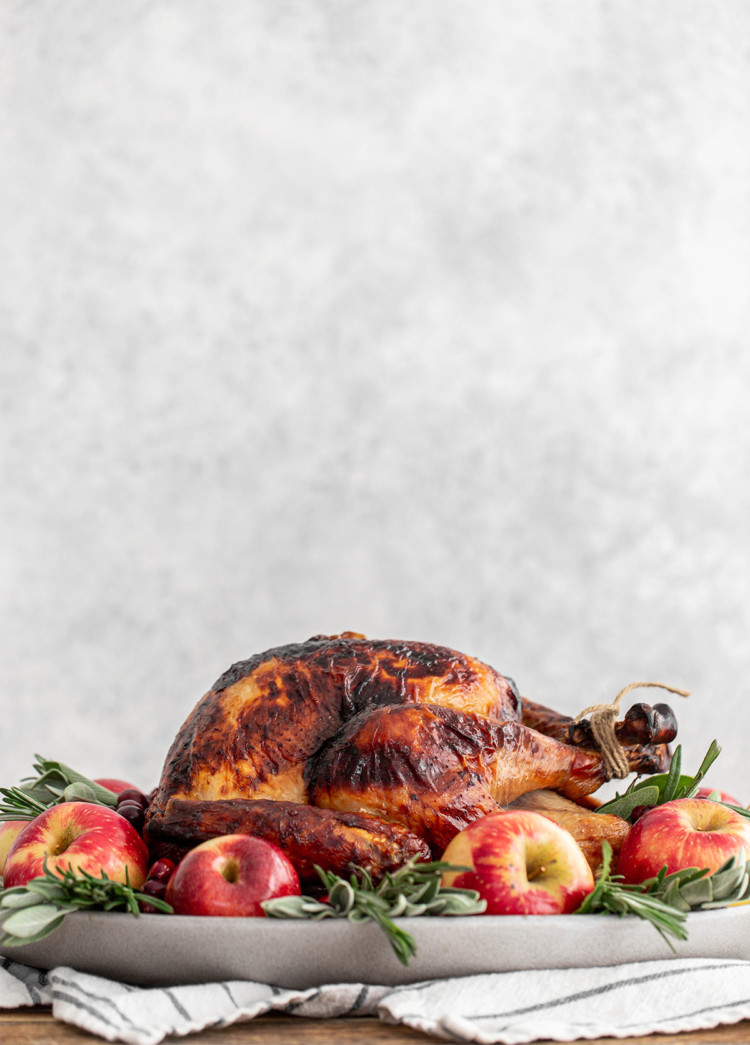
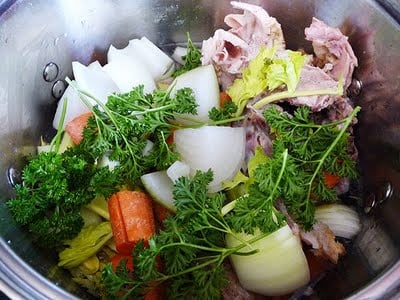

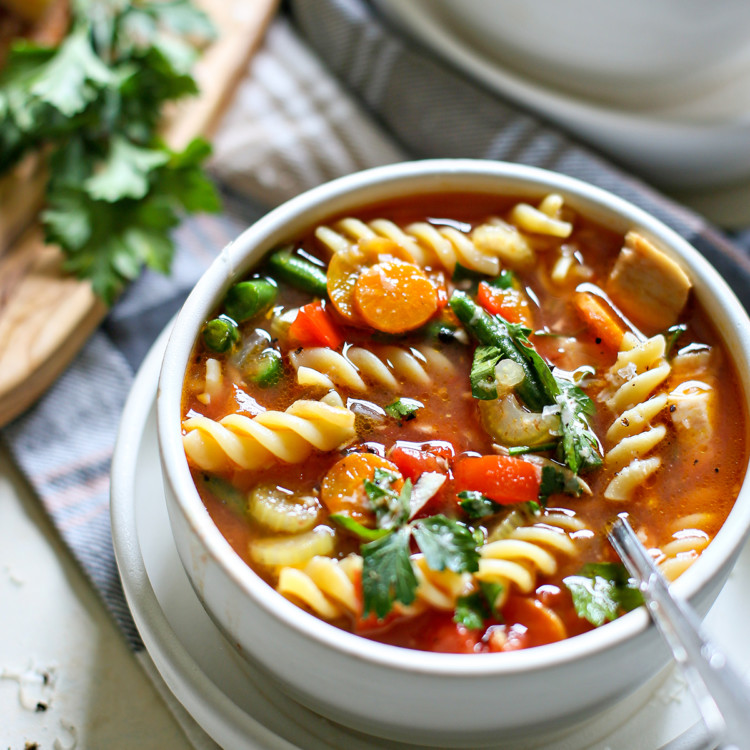
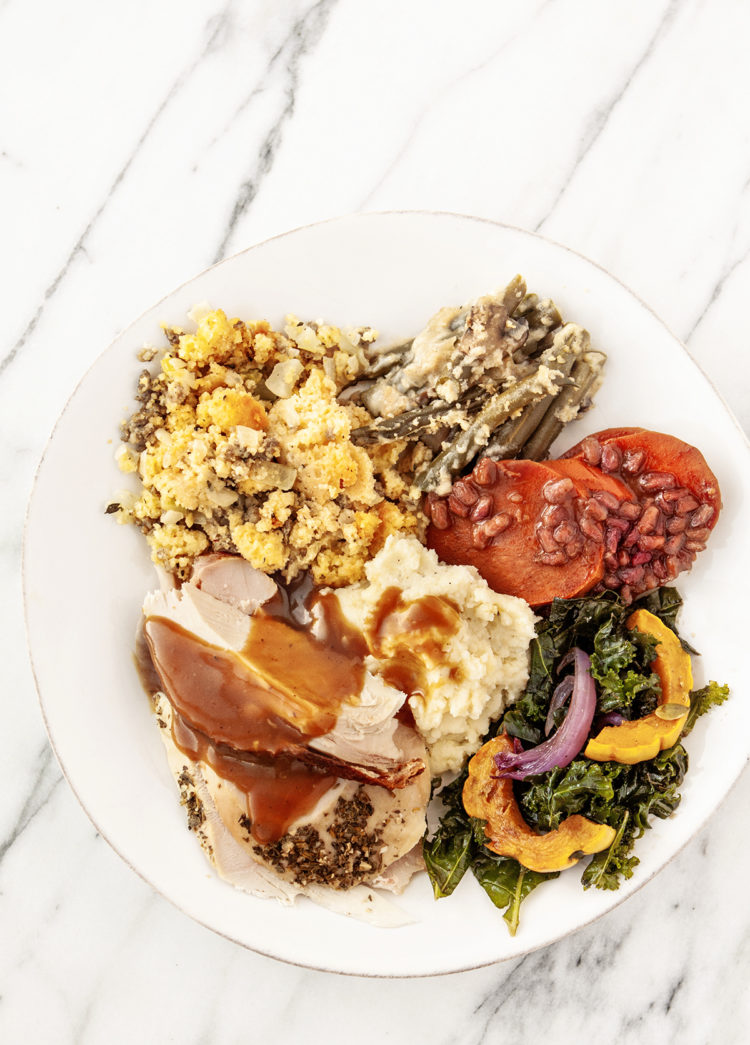
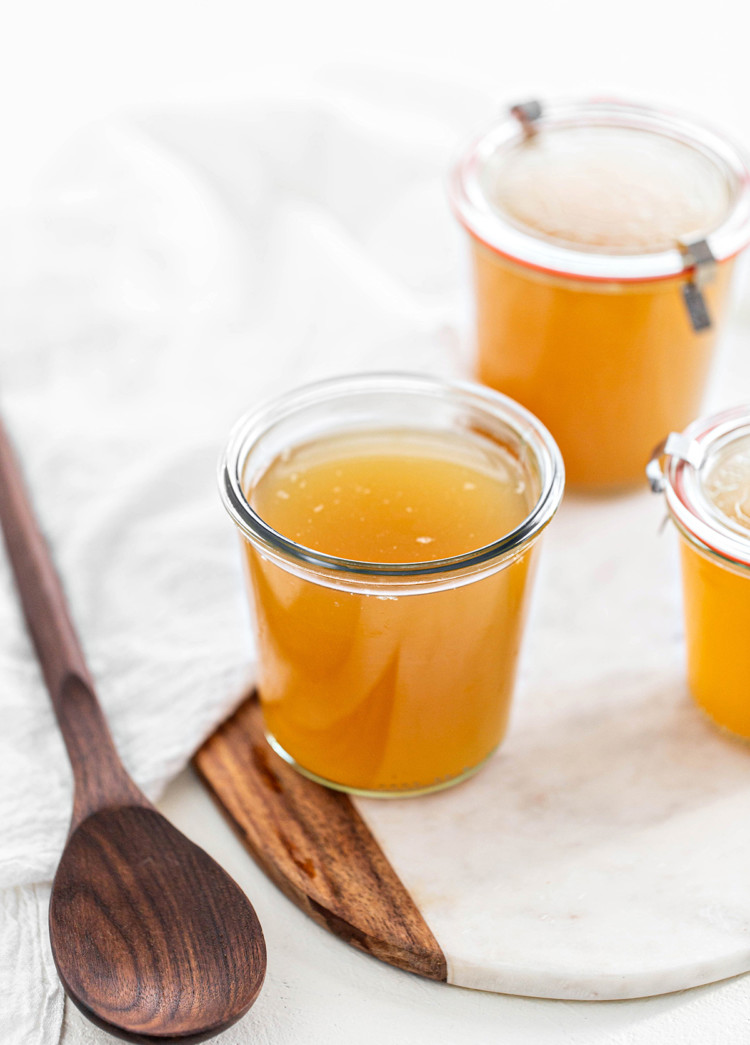

Gina Geller says
Hi Katie,
I just made this brine and its currently cooling on my stove. I went to double check that my turkey wasnt salt injected, and low and behold in the fine print it says my turkey has an 8% salt solution.
My question is, do you think if i water down the final brine (total of 3 gal water) will I be okay? I used 2 cups of diamond kosher.
Thanks!
Katie Kick says
Can you tell me if your kosher salt has guidelines on the box for how many cups of salt per gallon of water? Morton Kosher Salt, which is what I use suggests 1 cup of salt per gallon of liquid. However, Diamond Crystal recommends 2 cups of salt per gallon. This is because the crystals are different sizes. Let me know what the box says first and we can go from there. If I don’t respond quickly enough to the comment here, feel free to email me instead using the contact form on the website and I will get back to you ASAP.
Volker says
I miss a switch to select “American Granny measurements” and “Metric for Engineers” 😉
What the heck is a cup and a spoon? I have spoons and cups in at least 6 different sizes… Can’t you just say 50g or 80ml? Makes way more sense.
Katie says
Hi, I’m not sure what you mean. The only place I see where it says “cup and spoon” is under the list of tools you need for the recipe stating that you will need measuring cups and spoons. There is a printable recipe card at the bottom of the post that has all of the specific measurements in it. Let me know if you are unable to find it. Hope that helps.
Vanessa says
I made the Citrus herb brine with Morton’s kosher salt that your recipe say. I think that was way too much salt one cup probably could have done it. I did a 14 lb turkey brine him for 12 hours wash him thoroughly and did everything else as said tastes good but too salty.will try again
Katie says
I’m sorry that you felt it was too salty for you. Unfortunately, without knowing exactly what you did and what kind of turkey you used I can’t say what went wrong. We use all of the brine recipes on this website personally and haven’t had any issues in the past. Did you use a salt injected turkey? This recipe/instructions states that it is for a fresh turkey that is not salt injected. Did you add enough ice to bring the total liquid up to 2 gallons?
Scott F says
We can’t find fresh turkeys in our area; they are liquid added with what I assume is salt water (label actually says added turkey broth and seasonings) The nutrition information says each serving has 16% daily serving of salt. This brine sounds wonderful, but what adjustments can I make to the amount of salt in your brining recipe to compensate for this?
Katie says
I have brined pre-salted turkeys before myself. It is all kind of about personal preference though. Some people are really sensitive to salty foods and other people prefer more salt. Here are the precautions that I take so they don’t come out too salty:
1. Rinse the turkey well inside and out before putting it in the brine.
2. Brine on the shorter amount of time listed in the recipe so the turkey doesn’t absorb too much salt.
2. Rinse the turkey well inside and out upon removal from the brine.
3. Do not add any extra salt to the turkey interior or exterior before roasting. Adding herbs under the skin, pepper, onions/garlic inside the cavity, buttering the bird (use unsalted butter) etc. are all fine – just no salt.
If you are still concerned the turkey may be too salty, then I recommend decreasing the salt by 25% and keeping all other ingredients the same. So, for the Herb Citrus turkey brine you would use 2 cups of kosher salt instead of 2 2/3 while keeping the other ingredients with their original measurements.
If your turkey is too small for the amount of brine, make sure you decrease all the ingredients by the same amount. If you just decrease the liquid to make a smaller quantity then your turkey will be too salty.
I’m not sure how experienced you are with brines, but you have to use kosher salt. If you use table salt, the brine will be way too salty. I write all my recipes using Morton Kosher salt and that is the brand I recommend. If you can’t find that brand, another good one is Diamond Crystal, but you’ll have to use the following conversion when substituting that for Morton:
Tessa Brown says
@Katie, this sounds like an excellent recipe and I used it, however, I agree with the other post that it would be much too salty with this proportion of Morton’s kosher to water. I diluted it by half after reading the box of kosher salt which says 1 c per 2 gallons water. The box even says if brining for more than 12 hours to reduce it to 0.5 c /2 gallons
Katie says
The salt amount listed in this recipe is for a fresh, non-salt injected turkey and explained in the post. If you plan to use a salt injected turkey, then I recommend using 1 1/2-2 cups of Morton Kosher Salt. Rinse the bird inside and out before and after brining. Do not add any extra salt to season the bird and use unsalted butter if you plan to butter it.
Scott F says
@Katie, I followed all your recommendations including multiple pats of unsalted butter under the skin. Everyone (10)at the table agreed: Best Turkey EVER!! Totally the hit of the day. Thanks so much for the hints when cooking a liquid-added turkey. I added a couple cut up apples and onions to the cavity. Everyone loved the citrus overtones of the meat, and it was so moist! 5 stars
Gaelyn says
My turkey turned out wayyyy too salty. 🙁 Now looking at other recipes I realize 2 2/3 cup of salt is outrageous. There goes my thanksgiving turkey.
Katie says
I’ve made this recipe countless times and never had a problem with saltiness. I’d love to help you troubleshoot, so I’m including some of the typical errors that yield a turkey that is too salty.
Is it possible that you purchased a pre-injected turkey? These have already been injected with a salt solution and that’s why I don’t recommend brining those. Additionally, this recipe notes the following:
Step 5. Then, add in enough ice to bring the brine amount up to 2 gallons (2 gallons = 32 cups).
Step 6. This is very important otherwise you will have an incredibly salty turkey.
The recipe starts with 1 gallon of water, but you need a total of 2 gallons and you have to add enough ice to bring the final volume of the brine up to 2 gallons. Even if you don’t need such a large quantity of brine, for example if you are using a smaller turkey, you still have to add the same proportion of water to salt. You can’t decrease the water to make less volume. If you were wanting to make a smaller amount of brine, you would have to decrease every ingredient on the list the same percentage.
Another suggestion is to make sure that you don’t brine the turkey for longer than recommended and that you rinse the turkey after it comes outs of the brine and do not season with additional salt as that would be too much.
Johan says
@Katie, when I tried the recipe I was surprised with the amount of salt, so I halved it. That was fortunate, because I (still) missed the “add enough ice to bring the final volume of the brine up to 2 gallons” part. Fortunately using half the amount of salt preserved the right proportions (1/2 salt, 1/2 water) so it worked out, but the turkey still came out slightly too salty for my taste. I recommend you rewrite the recipe to state upfront that this involves 2 gallons of brine (of which 1 gallon water and 1 gallon ice) making it less likely that people ruin their turkeys. In addition, you could rewrite the recipe for 1 gallon of brine, making it more convenient for people to determine the right proportions (1 gallon x 2, x 3, x 1/2, etc) if they need different amounts of brine.
Katie says
Hi Johan, I’m sorry that you felt this was too salty for your taste. I agree that it was lucky you halved the salt and the water, because otherwise that would have been a very salty brine! If your turkey was a salt injected turkey, not a fresh turkey as mentioned in the recipe card, then it could turn out saltier than you would like due to the added salt during processing. I recommend using less salt (3/4 cup – 1 cup per gallon) if it is a salt injected turkey. I also recommend: rinsing the bird before and after brining to remove any excess surface salt, not adding additional salt to season the bird after brining, and using unsalted butter. Brining time can also affect the saltiness of a turkey. A smaller turkey does not need to bring for more than 12-24 hours, where a larger 20 lb turkey can easily brine 24-36 hours.
Erin @ Texanerin Baking says
Oh goodness. I’m so happy that turkeys are hard to find here. I went looking last year and the biggest I could find was about 6 pounds. No big turkeys is a great excuse to just continue on with my turkey breast! I think I’ll make a turkey breast adapted version of this on the weekend. Can’t wait to try it!
Laura says
Can u also brine turkey pieces. How Lon?
Katie says
How big are the pieces? A turkey breast only needs to brine for 3-6 hours, depending on the size. Something the size of a boneless, skinless chicken breast only needs about an hour.
Sarah Y. says
I made a turkey for the first time ever this year – and shared it with our family of 10 adults. I used this brine recipe then stuffed the turkey with onions, carrots, sage and thyme. This was the best we have ever had, no kidding. This brine made the turkey so moist and delicious. My father, who is a dark meet eater because white meat is too dry, made the comment that the white meat of this turkey was better than the dark. Thanks for sharing and helping me make my first turkey experience wonderful.
Donna B. says
I use fresh herbs in just about everything (I grow them indoors in the winter) but probably the thing I do the most is scrambled eggs 🙂 I add fresh parsley, thyme, a hint of rosemary and savory, and then also add some feta for a little salty sharpness. If I have some bacon, ham or sausage I may add that too or serve it on the side. Much easier than an omlette.
I have this for breakfast several days a week, and probably at least 2 nights for dinner.
Stefani says
my favorite vinaigrette using fresh herbs:
-1/3 cup extra-virgin olive oil
-1/3 cup balsamic vinegar
-1-2 tsp. sugar
-1/2 tbsp. thyme
-1/2 tbsp. basil
-1 tsp. dijon mustard
-1 clove garlic, minced
-1/8 tsp. pepper
Combine ingredients and shake well.
Liz says
I can’t find my recipe, but our stuffing has loads of fresh herbs in it, as well as sausage, bourbon, and pecans. It is delicious!
Kim says
I have heard some people say to rinse the turkey after brining to get rid of extra salt. Do you rinse yours before? I would think rinsing would take much of the flavor out, but I am not sure. Thank you, and thank you for sharing your wonderful talents with us.
Katie says
Honestly, I have never done that because it’s a hassle to handle the turkey and rinse it without making a huge mess. I always buy a fresh turkey. I know some of the frozen ones have already been pre-brined in a plain salt water solution so perhaps that is why some rinse it. I’m not sure.
Jen at The Three Little Piglets says
It wouldn’t make a huge difference if you rinsed it after you brined, just so long as you clean it well before you brine. The point of brining is to allow osmosis to transfer some of the salt (and thus flavor) into all of the meat. Allowing a long time in brine (like 24 hours) ensures that the salt is really evenly distibuted throughout the turkey. Because nomally we tend to season just the top of our turkey, the outer cut is really flavorful, and then the inside not so much… Brining ensures that all of it is seasoned. As does stuffing the cavity of the turkey with fresh herbs before it goes in the oven.
Tameka Downing says
I always brine my turkey. I also brine my chicken and pork. I will have to try this recipe for my next dish.
Annie @ Annie's Cooking Lab says
That sounds great! I’m a vegetarian, but somehow I always get roped into helping with the turkey even though I won’t be eating it 🙂 This sounds like a delicious, new way to prepare it!